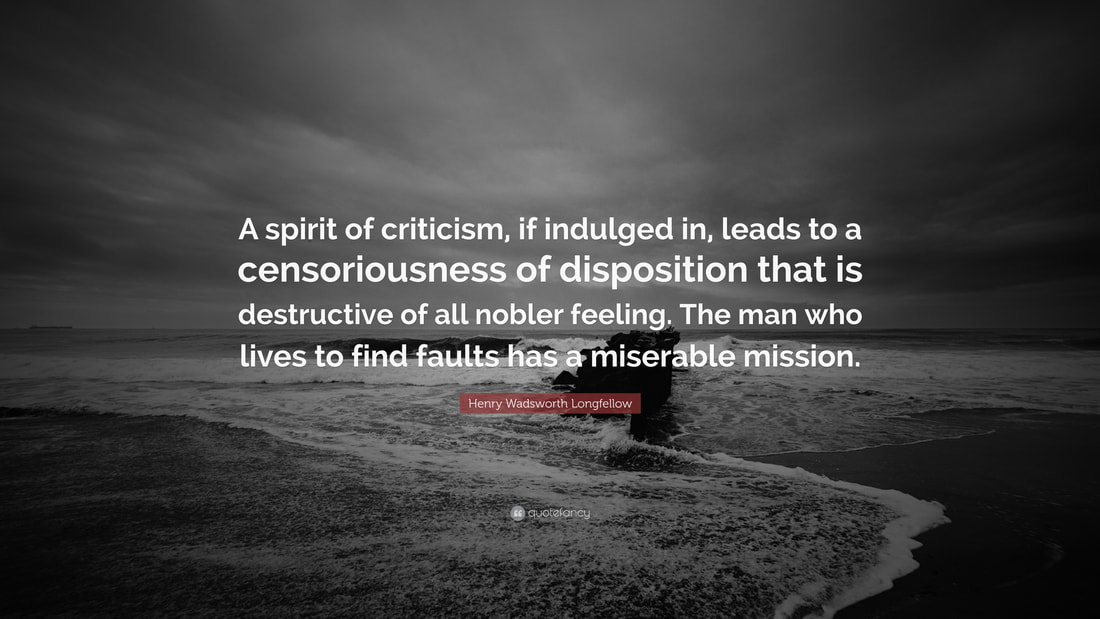Matthew 7:1 NIV “Do not judge, or you too will be judged".
Jesus was aware of human nature and our propensity to measure everyone else by ourselves. We want to force others to fit exactly into the box that we create for them and ourselves. So, Jesus gives us clear and stern instructions: “Do not judge, or you too will be judged”! Don’t commit the sin of censoriousness.
Here’s the way that the Message Bible puts it, “Don’t pick on people, jump on their failures, criticize their faults—unless, of course, you want the same treatment”.
Jesus clearly avoided taking a position that would cause anyone to say, “Christ is the end of the law; now I can do whatever I please.” When Jesus said, “Do not judge,” He was not taking the position of some non-Christians and even some Christians that “Christ is the end of the law; now I can do whatever I please.”
He said earlier in His Sermon “Do not think that I have come to abolish the Law or the Prophets”,
Matthew 5:17-18 NIV “Do not think that I have come to abolish the Law or the Prophets; I have not come to abolish them but to fulfill them. For truly I tell you, until heaven and earth disappear, not the smallest letter, not the least stroke of a pen, will by any means disappear from the Law until everything is accomplished.
The Law is good. All the duties, all the responsibilities, and all the demands of the law remain (I am talking about the Ten Commandments and the moral laws that deal with our relationship with God and people, and not the food or clothing laws of the Mosaic Law).
1 Timothy 1:8-11 NIV We know that the law is good if one uses it properly. We also know that the law is made not for the righteous but for lawbreakers and rebels, the ungodly and sinful, the unholy and irreligious, for those who kill their fathers or mothers, for murderers, for the sexually immoral, for those practicing homosexuality, for slave traders and liars and perjurers—and for whatever else is contrary to the sound doctrine that conforms to the gospel concerning the glory of the blessed God, which he entrusted to me.
Jesus would never advocate anarchy. He knows human nature well enough to know that authority, government, and a judicial system are necessary. So, Jesus was not saying that we should do away with the due process of law. He was also not saying that we can’t or shouldn’t make moral judgements. Jesus Himself made moral judgements. He called the Pharisees whitewashed tombs, and He announced that if they did not repent, they would surely perish.
Matthew 23:27-28, 33 NIV “Woe to you, teachers of the law and Pharisees, you hypocrites! You are like whitewashed tombs, which look beautiful on the outside but on the inside are full of the bones of the dead and everything unclean. In the same way, on the outside you appear to people as righteous but on the inside you are full of hypocrisy and wickedness. 33 “You snakes! You brood of vipers! How will you escape being condemned to hell?
Because of our hesitancy to make moral judgements, we tend to drift into an indiscriminate moral neutrality. The correct position is that we should judge morally but also be prepared to be judged morally.
Matthew 7:2 NKJV For with what judgment you judge, you will be judged; and with the measure you use, it will be measured back to you.
This promise reflects the law of reciprocity, a law that states that we always get back what we give out.
Galatians 6:7-8 NIV Do not be deceived: God cannot be mocked. A man reaps what he sows. Whoever sows to please their flesh, from the flesh will reap destruction; whoever sows to please the Spirit, from the Spirit will reap eternal life.
You reap what you sow. Sow dishonesty reap dishonesty, Sow stealing reap stealing, sow nit-picking, fault finding, and cutting other people down to our size, reap sin nit-picking, fault finding, and being cut down to someone else's size. On the other hand, the opposite is also true: sow truth, reap truth, sow faithfulness reap faithfulness, sow love reap love.
Censoriousness reveals the following things about us.
- our sins,
- our jealousies,
- our ignorance,
- our inability to deal with our own problems,
- and our lovelessness.
So each time we judge somebody, we are saying to all who have ears to hear, “This is the kind of unloving person I am.”
Romans 2:1-3 NIV You, therefore, have no excuse, you who pass judgment on someone else, for at whatever point you judge another, you are condemning yourself, because you who pass judgment do the same things. Now we know that God’s judgment against those who do such things is based on truth. So when you, a mere human being, pass judgment on them and yet do the same things, do you think you will escape God’s judgment?
God, who can judge is He perfect. He judges censoriousness because.
- Nit-picking, fault finding, and cutting other people down to our size, hinders God’s work;
- When we are censorious, we are assuming God’s position as judge;
- It destroys what God has given, which is a person’s character and influence.
- It is showing contempt toward the grace of God, which is extended to those we would destroy by nit-picking, fault finding, and cutting them down to our size.
Why are in no position to be censorious
Not one of us is without sin; not one of us is free of glaring defects in our own life.
Matthew 7:3-4 NIV “Why do you look at the speck of sawdust in your brother’s eye and pay no attention to the plank in your own eye? How can you say to your brother, ‘Let me take the speck out of your eye,’ when all the time there is a plank in your own eye?
If there is anything that Jesus does not want his followers to be, it is hypocrites. Jesus was saying, “Look at the ridiculous role you are playing. With a glaring flaw in your own life that everyone else can see, you nitpick at the small problems in the lives of others.”
The right answer
We have our hands full in correcting the problems in our own lives without nit-picking or being overly critical in our judgment toward others. We could spend our time quite constructively if we concentrated on our own faults, leaving the faults of others to the goodness and grace of God.
Matthew 7:5 NIV You hypocrite, first take the plank out of your own eye, and then you will see clearly to remove the speck from your brother’s eye.
First, we should recognize nit-picking, fault finding, and cutting other people down to our size as sin. It is a sin, just as stealing or lying or immorality is a sin. In God’s eyes, being critical and hurtful toward others is a serious sin because it doesn’t show the love that Jesus says is the second greatest commandment.
Matthew 22:34-40 NIV Hearing that Jesus had silenced the Sadducees, the Pharisees got together. One of them, an expert in the law, tested him with this question: “Teacher, which is the greatest commandment in the Law?” Jesus replied: “ ‘Love the Lord your God with all your heart and with all your soul and with all your mind.’ This is the first and greatest commandment. And the second is like it: ‘Love your neighbor as yourself.’ All the Law and the Prophets hang on these two commandments.”
Second, we should confess our tendency to judge as a sin. Only through confession will we ever rid our lives of the deadly sin of nit-picking, fault finding, and cutting other people down to our size.
1 John 1:9 NIV If we confess our sins, he is faithful and just and will forgive us our sins and purify us from all unrighteousness
Third, we must quit doing it. It is not enough to own up to the sin and ask God to forgive us. We must also claim the grace of God that will enable us to stop.
One day while walking in Florence, Italy, Michelangelo came across a piece of discarded marble. He had it brought to his studio. Someone else had started to work on the marble but had cast it aside as useless. Michelangelo said, “There is an angel imprisoned in this piece of marble, and it is my task to bring out that angel.” This is exactly what we are supposed to do. We are to see the good in people and by the grace of God bring it to the surface.
Three good filters through which we should pass every word that comes from our mouth are: Is it true? Is it necessary? Is it kind?


 RSS Feed
RSS Feed